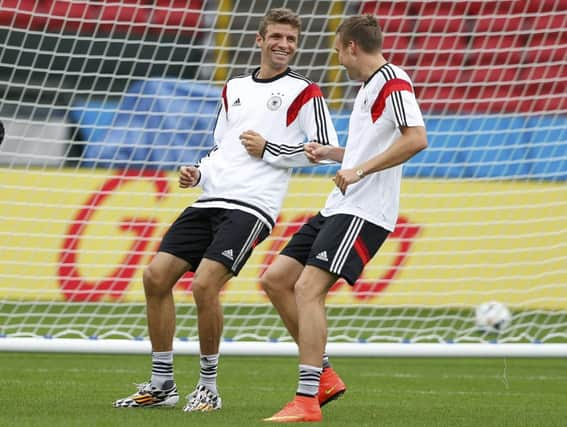World Cup: Germany wary of Algerian vengeance


Today in Porto Alegre, Algeria face Germany for the first time since that infamous match – with a spot in the quarter-finals on the line.
On paper, this match should be no contest.
Germany are three-time champions with top-quality players in every position while Algeria have advanced past the opening round for the first time.
Advertisement
Hide AdAdvertisement
Hide AdAdd in the revenge and momentum elements, however, and this could become one of the most emotionally charged matches of the last 16.
“At a World Cup, there are no desirable opponents and no easy opponents, especially not in the knock-out matches,” Germany coach Joachim Löw said. “The Algerians have proven that they are an uncomfortable rival. We’ll be well prepared.”
Algeria are one of only three countries with a 100 per cent win record against Germany. Of the other two, East Germany (one match, one win) don’t exist, while Germany’s only game and only loss against Egypt came in 1958.
Algeria beat Germany 2-0 at home in a friendly in 1964 and won 2-1 in the opener for both teams at the 1982 World Cup in Spain. However, in their third group game in 1982 in Gijon, Germany scored in the tenth minute and for the next 80 minutes the Germans and the Austrians pushed the ball around without any real effort to score since that result allowed both to advance at the expense of Algeria.
Algeria had little to cheer about until beating South Korea and drawing with Russia in the group stage this year, producing a late equaliser against Russia to go through.
“This Algeria team has a lot of margin to [improve] and I suspect that we can [do] a lot better maybe in the next round against Germany,” Algeria coach Vahid Halilhodzic said. With Ramadan set to begin over the weekend, Halilhodzic suggested that his players would receive a special dispensation from a traveling imam to avoid fasting ahead of the Germany game.
Germany, meanwhile, are in perfect health after their 1-0 win over the United States.
“We are very ambitious and we have big goals,” said Thomas Müller, the team’s top scorer with four goals.
Advertisement
Hide AdAdvertisement
Hide AdWhile Müller’s place in the starting line-up is not in question, Mario Goetze should replace Lukas Podolski in the other forward position after the Arsenal striker picked up a thigh muscle injury in their last group game. Podolski, who is no longer an automatic starter for the national team, was injured in the first half of their 1-0 win over the United States and was taken off at half-time. Tests late on Saturday showed he would not be available for their first knock-out game in the tournament.
The 29-year-old, who has won 116 caps and is playing in his third World Cup, came on as a late substitute in the opening 4-0 win over Portugal but did not feature in the other group game against Ghana.
Löw is likely to keep defensive midfielder Bastian Schweinsteiger in the line-up in place of Sami Khedira.
Schweinsteiger was praised for his performance against the Americans but hasn’t appeared to have the energy for more than 70 minutes after nursing a knee injury before the World Cup.
The winner at the Estádio Beira-Rio will go on to play France or Nigeria.
“We are basically taking the rivals as they come, we are focusing on ourselves. We wanted to be first in the group at any cost and we achieved it,” Löw said. “It’s all or nothing now.”
Germany might be overwhelming favourites to beat the Algerians, but even if things go wrong Löw has been assured that he will remain in charge.
The manager extended his contract prior to the World Cup until 2016 with no conditions attached.
Advertisement
Hide AdAdvertisement
Hide AdAfter reaching the last four in three tournaments, expectation levels are high in Germany and anything less than that again will be deemed a failure.
“We still have the clear intention of carrying on with him,” said the German Football Association (DFB) president Wolfgang Niersbach to Germany’s Stern magazine. “There are no clauses in his contract which state that it depends on certain results.”
Nevertheless, few expect Germany to fall today, while a quarter-final clash with France or Nigeria will also see them regarded as favourites.